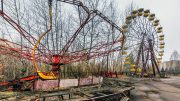Australian bush fires kill 1 BILLION animals
Australian fires kill 1 BILLION animals
Australian Bush Fires Recap
- The fires started on 12 November 2019 and continue to rage two months on.
- The fires are a regular natural occurrence in Australia but never before on such a scale.
- Unusual water temperatures in the Ocean West of Australia, which the Australian government acknowledges as caused by climate change, caused a lengthy drought, leaving Australia covered in highly flammable dried vegetation scorched by the sun as the Southern-Hemisphere summer kicked in.
- The summer brought higher than usual temperatures which ignited the drought struck lands.
- Australian authorities have failed to utilise the Aborigine skill set of micro-low-intensity controlled scrubbing to fire guard the lands.
- Fire fighters who risk their own lives, many of whom in the rural regions are voluntary unpaid fire fighters who do not have adequate equipment and resorted to using their own vehicles and home made equipment to try and tackle record breaking blazes.
- Aborigine managed land was statistically less severely affected by the fires, in large due to better land management techniques.
- Fences which trapped animals were not removed, meaning animals on a staggering scale are being trapped in pens and burned alive.
- The Australian Prime Minister Scott Morrison, came under intense criticism for taking a personal vacation to Hawaii when the fires broke out instead of staying in Australia and organising emergency responses.
- PM Morrison was further criticised for his initial refusal to reimburse rural voluntary firefighters for the loss of their vehicles and home made equipment they were forced to use because the government did not provide fire engines or equipment adequately.
- Animals, trees, businesses, homes and cultural sites have been lost on an unimaginable scale.
- The fires which are the size of Korea, have caused a smoke cloud that stretches all the way to South America.
- Initial estimates of 480 million animals killed by the fires have now been revised to 1 billion animals! The long term effects of such large scale death may take years to fully understand.
1’000’000’000 animals killed
Heroic Australian firefighters used a slight drop in summer temperatures last Tuesday to strengthen containment lines around the devastating wildfires as the financial and environmental costs of the crisis come into shocking clarity.
More than 25.5 million acres of land (an area the size of South Korea) have been totally destroyed by bushfires across the country over the last two months, with the southeast particularly hard hit.
Imagery posted online from the Himawari 8 Japanese satellite and NASA’s Earth Observatory showed plumes of smoke from the fires reaching as far as South America.
The devastating bushfires are exacting a heavy human toll — at least 24 people have died since September. Wild animals have fared much worse.
The University of Sydney ecologist Chris Dickman stunned people recently with his estimate that 480 million animals have been injured or killed in Australia’s bushfires. A few weeks later, the fires have spread even farther, and he’s updated the impact to include 1 billion animals.
“The 480 million estimate was made a couple of weeks ago, and the fires have now burnt over a large area of the further country. That means over 800 million mammals, birds, and reptiles have been affected by the fires. Australia-wide, it’s probably over a billion. I think there’s nothing quite to compare with the devastation that’s going on over such a large area so quickly. It’s a monstrous event in terms of geography and the number of individual animals affected.”
Since you’re here …
… we have a small favour to ask. More people are reading Al-Sahawat Times than ever but advertising revenues across the global media industry are falling fast. And unlike many news organisations, we haven’t put up a total paywall. We want to keep our journalism as open as we can. So you can see why we need to ask for your help. Al-Sahawat Times’ independent, investigative journalism takes a lot of time, money and hard work to produce. But we do it because we believe truly ethical media and an unbias perspective really matters.
“I appreciate there not being a paywall: it is more democratic for the media to be available for all and not a commodity to be purchased by a few. I’m happy to make a contribution so others with less means still have access to information.”
If everyone who reads our reporting, who likes it, helps fund it, the future of ethical media and the futures of our staff and their families would be much more secure. For as little as £1, you can support Al-Sahawat Times and it only takes a minute. Thank you.
This story is available on:
Talk to a journalist
Email: NewsDesk@alsahawat.com
Web: alsahawat.com
Follow Al-Sahawat Times
⬆️ Follow on Instagram
⬆️ Follow on Twitter
⬆️ Follow on LinkedIn
⬆️ Follow on Facebook
⬆️ Follow on YouTube
Read it on FLIPBOARD
Views: 0





